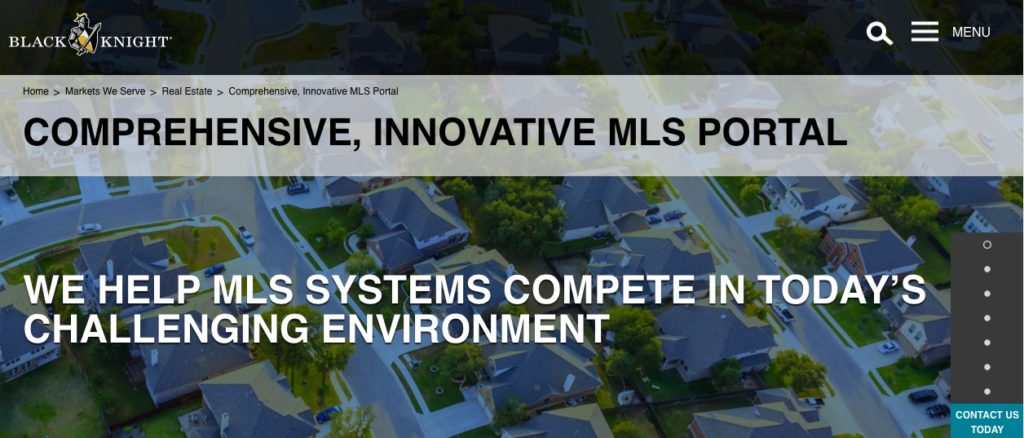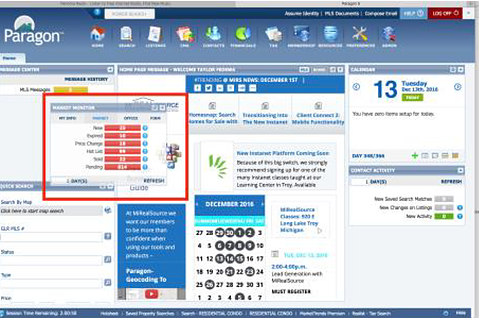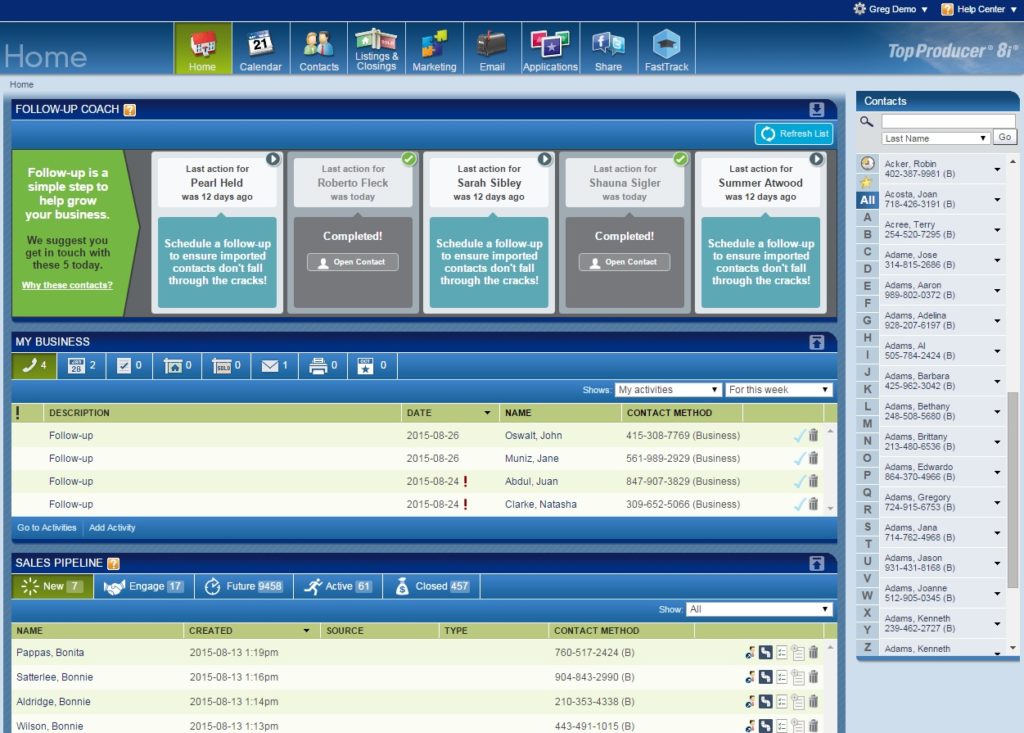Happy Friday everybody! With due apologies to my Ohio State fans, I confess I’d really like to see Wisconsin drub the Buckeyes tomorrow to throw the entire CFB playoff picture haywire. Wouldn’t mind seeing Arkansas shock the world either.
In any event, over on Vendor Alley, the co-host of Industry Relations, Greg Robertson has some advice for ah… legacy vendors:
I see a trend coming back. And it’s not necessarily a good thing. I hear it at conferences, see it in comment threads, and quoted in media outlets. It usually goes something like this..
“We are a legacy MLS Vendor….”, “our legacy system….”, “the legacy software provides…”
Stop this practice immediately. This phrase came from the old hardware days of “big iron”, with room size computer hardware systems that soon became outdated. Software never sleeps. Legacy means “old”, it means “tired”. I think “traditional” also falls in to this same trap.
He thinks that legacy vendors should embrace new words instead:
The words we use to describe others, ourselves, our company, our products matter.
Here are a few phrases to help you get started.
- Battle-tested
- World-class
- Industry leading
- Proven
- Innovative
- Popular
- Respected
All solid advice and one that the marketing departments of various legacy battle-tested vendors ought to consider.
However, there is something they ought to consider as well, which is that words matter, yes, but actions matter even more. Ultimately, products matter, and there’s only so much lipstick you can put on a pig before you start sounding like Baghdad Bob.
More Than Words
Let’s start with the word “innovative.” Certainly, any vendor can describe itself as innovative. We have no shortage of companies in real estate who claim innovation as their core identity. Inman does an annual Innovators Award to recognize the numerous companies who are all about innovation.
So let’s take a look at a legacy industry leading vendor who has embraced Greg Robertson’s teachings:
Paragon MLS is not only comprehensive, it is innovative. Further down, you discover that it is award-winning. It isn’t immediately clear which award that was, and when, but we know Paragon MLS won the award. Then we get this fantastic copy:
Our comprehensive, highly configurable Paragon system is a nationwide MLS portal and includes countless innovative and leading-edge capabilities allowing us to be your go-to MLS vendor. Used by more than 200 Multiple Listing Services organizations across the U.S. and Canada, Paragon raises the bar for client connectivity.
That’s really good copywriting. Whoever wrote it should win an award, I think. I mean, “countless innovative and leading-edge capabilities” just flows! And they can’t even be counted! They are infinite, like the stars strewn across the black velvet of the polar night sky!
Then, you login to Paragon and get this:
If you’re thinking, DAFUQ? you will be forgiven for failing to count the innovations, for they are uncountable, like the stars in the skies and the grains of sand on the beaches.
What about non-MLS systems? Here’s a legacy proven, popular and respected CRM system:
At least Top Producer’s website doesn’t use the word “innovative” or “innovation” anywhere in its copy. So maybe their marketers need to start using more exciting words to describe this… pile of provenness, popularity, and battle-testedness.
The point is that words do matter, yes, but substance matters even more. Actions matter more. That which we call a rose by any other name would smell as sweet… but it has to smell sweet in the first place.
The Example of BMW
Let’s take a look at some legacy vendors/companies in other industries for an illustrative example.
It’s difficult to be more of a legacy company in automotive than BMW. The 3-series has been in Car and Driver magazine’s Ten Best list 22 times, by far the longest stint of any vehicle, ever. With stiff competition from just about every car company in the world, BMW remains the first name in anyone who has made a bit of money and thinks, “I want a sporty luxury car.”
This is the BMW E36 3-series, which was on the Car and Driver Ten Best list every single year it was in production from 1990 to 2000.
I particularly remember this car because 1993 was when I graduated college, and 1997 was when I graduated law school, and I really, really wanted one of these. I remember reading all about them in print magazines (because the internet wasn’t really a thing back then) and being impressed with the styling, the power, and the innovations, like Z-axle.
If there is a case to be made to rest on one’s laurels, I think the BMW E36 is it.
BMW did no such thing. In 1997, BMW introduced the E46, which brought things like satellite navigation, electronic braking, rain-sensing wipers, LED tail-lights, and valvetronic technology to the 3-series. In 2004, BMW introduced the E9X series, which brought turbocharging, run-flat tires, as well as fairly dramatic style changes. In 2011, BMW brought forth the sixth generation: F30/F31/F34 cars. Some of the changes here: turbocharging across the entire 3-series, plug-in hybrid, and a bunch of new comfort technologies.
And in 2018, BMW introduced the seventh generation: G20.

The point is that if terms like battle-tested, world-class, industry leading, proven, innovative, popular and respected apply to any legacy company, it would have to be BMW. It is all of those things.
And yet, this world-class legacy company did not rest on its legacy. It continually pushed things forward, sometimes with great results and sometimes with not-so-great results. But there’s no way that anyone in 2019 would be buying a new E36, no matter how awesome that car was in 1994.
BMW has plenty of competition today, as it always has had. Newer cars like the Audi A4, Alfa Romeo Giulia, and even Hyundai’s Genesis G70, the 2019 MotorTrend’s Car of the Year:
Maybe it’s because of that competition, but BMW cannot sit on its laurels, and use words alone to convince people to buy its cars. It has to keep innovating, keep pushing, keep trying new things, keep going.
What about the legacy vendors in real estate?
FlexMLS Makes Improvements
Greg talked about FBS:
I was talking to Dave Rifkin, VP of Sales at Flexmls at the last CMLS Conference. He told me that at FBS they don’t use the phrase “legacy” to describe their MLS System, they say “Flagship”. Which I thought was brilliant. Words matters. The internal dialogue we have with ourselves matter. The words we use to describe others, ourselves, our company, our products matter.
Yes, the words you describe to your products matter. But what matters more is the actual product. FBS has made some significant design and usability updates in its legacy flagship Flexmls product, as you can see here:
This is not just changing the words you use to describe yourself or your products. This is actually offering a better product. Even if FBS kept using the word “legacy” to describe its Flexmls product, anyone with eyes can see that there’s nothing “legacy” about what is right in front of them.
Contrast that with some of the other legacy battle-tested vendors in our space. What have they changed? What improvements have they delivered?
Or are they just calling a dumpster fire something prettier — “warmth, heat, and light from battle-tested, industry leading software stack.”
So yes, words matter. But actions matter more. Product matters more. More than words is all you have to do to make it real. Then you wouldn’t have to say that you’re innovative and popular and industry leading. ‘Cause we’d already know.
-rsh







6 thoughts on “Pro Tip: Words Matter, But Actions Matter More”
Rob,
You wrote what I’ve been thinking since I read Greg’s post….
No matter what words they use to sell their products to the MLS, this industry should get rid from this old 1800s MLS system.There is no need of it anymore as it does not serve the consumer.Real estate agents SHOULD NOT follow the MLS rules and regulations if they want to survive the fierce competition they are facing.It gets harder to succeed nowadays with all the new technologies out there. The MLS system is preventing the agents from flourishing.Personally I know some real estate brokers who does not agree with many of the MLS rules not to talk on the many agents I know who would be very happy if the MLS will vanish tomorrow morning.
Bingo Bert.
What does that have to do with MLS tech vendors??
I mostly agree with Rob’s post. FlexMLS?? Let’s see what they actually do. I sent to referral this year to an agent in Indiana. The agent sent me a search using FlexMLS. It was pretty unimpressive. The old guard sucks. The new guys in the MLS space are way more interesting – BoxMLS, CloudMLX and Remine.
I responded to Greg’s post this way:
On the other hand, if it looks like a duck and quacks like a duck, it’s a duck. It’s not “flagship” if it’s basically a retread of the same tired early 2000s UI. Yeah maybe some of the underlying code has been tweaked a bit, but it’s still tired. So to me, the “flagship” MLS providers are every bit legacy software. Quack!! By the way, I do not include W+R in this group. ? I’m very glad that W+R “Thinks Different”, to borrow from and old Apple ad campaign.
At the core of the issue is the fact that the MLS was NEVER intended for public use.
It was and it remains an industry dB that was designed to be for industry use only. Then some genius decided that because it was the ONLY dB the brokers had, that they should syndicate that raw data to the portals for use in the consumer space.
Wrong move. Really wrong move.
That is because all, as in all the real rich marketing content, resides with the broker and the agent and NOT with the MLS. Garbage into the business system, and unfortunately for the industry, garbage then shows up on the consumer portal.
Try and find a Matterport VT or a 3D doll house rendering, or an interactive floor plan in the MLS dB or ultimately posted on a Zillow listing ad. Not there. Brokers and agents need to link off to property web sites in order to share this content and that sucks when it comes to a uniform search experience or UX.
When you start with a zero (MLS tech) and multiply it by 2.5 million listings you still get at the end fo the day (wit the consumer experience) a zero. And nothing about this sad reality of our business “quacks me up.”
Comments are closed.